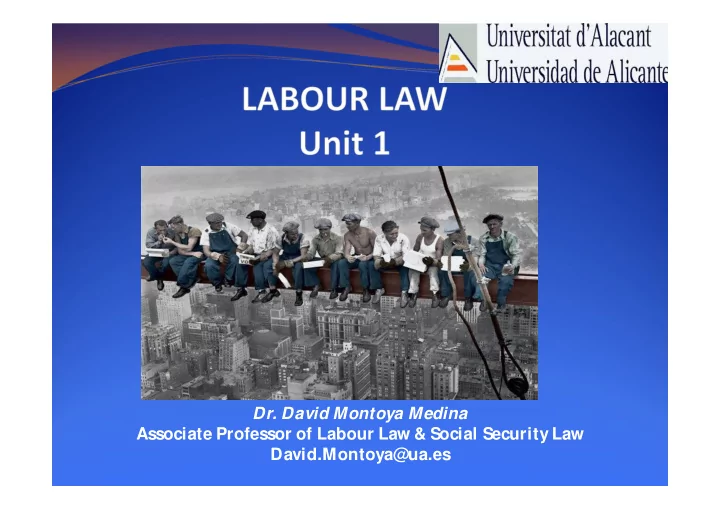

Dr. David Montoya Medina Associate Professor of Labour Law & Social Security Law David.Montoya@ua.es
1 ) Labour Law as an AutonomousLegal Discipline: What is Labour Law? 2) Historical, Social & Legal Factorsthat led to the emergenceof Labour Law
A first approach to the concept of Labour Law 1 .- What is basically Labour Law? 2.- What makes the difference between Labour Law and other areasof our legal system?
-Set of the social relations that arise from the services rendered from one person to somebody else Not all kind of work is regulated by Labour Law!!!: - Free/Volunteer Work - Remunerated/Paid Work - Dependent Work (under direction&supervision of another person) - Hired-Hand Work (on behalf of somebody else)
1 .- VOLUNTARILY (Free/volunteer work) 2.- FOR COMPENSATION (Remunerated/paid work) 3.- ON BEHALF OF SOMEBODY ELSE (Hired-hand work) 4.- UNDER HISORGANIZATION AND SUPERVISION (Dependent work)
Labour Law, as an autonomous legal discipline, counts nowadays with its own principles and institutions. But it doesn’t existssince ever: INDUSTRIAL REVOLUTION Free, paid, hired-hand, Work governed by Civil Law: dependent work Servicescontract & Free will principle Appearance of the first State labour standards inspired on a totally opposed principle: the principle of limitation of the parties’ free will
Principle of limitation of the parties’ free will 1 .- Aimed at protecting the weaker party of the contractual relationship 2.- Meaning: The contract is not the main source of the parties’ rights and obligations but the labour standards: Contract of employment asa “ Regulated Contract ” 3.- Principles currently governing the application of Labour Law regulations: 1 ) More favourablerule (art. 3.3WS) 2) More beneficial condition (art. 3.1c WS) 3) Inalienability of rights (art. 3.5 WS)
Definition of Labour Law Rendered voluntarily for compensation On behalf of somebody else Area of Law which regulatesthe personnal services Under his direction and subordination Which has its own inspiring principles
Labour Law Birth: Work legal regime & Labour Law 1 .- Slave mode of production : Work legal regime based on property rightsof aperson over another… … COERTION 2.- Feudalism : Work legal regime based on subordination in the frameof vassalage relationships … … COERTION 3.- Capitalism : Work legal scheme based on FREE exchange of labour for remuneration, governed by Civil Law and servicescontract GENESIS OF LABOUR LAW
Labour Law Birth: How did Labour Law emerged throughout the history? Labour Law as theresult of a rangeof historical, legal, social and political factors: 1 .- Sociological Factor: Industrial Revolution 2.- Legal Factor: The liberal-individualistic Law 3.- Social Factor: Labour movement 4.- Political Factor: State intervention in labour º relationsregulation.
Sociological factor: Industrial revolution and its social effects Social changes brought by the Industrial Revolution: 1 .- Change in work organization : From the work in the field, farms and workshops, production turns to be concentrated on factories (capital concentration-companies are founded- large-scale production). 2.- Change in the structure of the working population. Feudalism: capital and workforce concentrated. Feudalism: dissociated: a) Craftsmen, farmers, etc wealthy so they raise capital and set up factories . b) Those citizens with no capital so they can only “sell” their workforce for a living.
Legal factor: Liberal-individualisticLaw and its social disfunction Liberal Law relieson principlesof Freedom & Equality In Labour relations: 1 ) Freedoom of contracting : Parties’ free will governed the labour relationship (they were free to sign or not the contract, to negotiate the termsand when to terminate it). 2) Unionism prohibition : Combinations of workers=crime of “criminal conspiracy” (Unions affected the parties’ freedoom, not letting workers to hire under a minimum working conditions) * Social effects: No material freedom nor equality
Social factor: the labour movement (main trigger for Labour Law birth) Workersreaction against theabusesof the liberal system -First workerscollectiveactions: clandestine meetings, demonstrations, strikes, violent actions (Luddite) 1 ) From the point of -First workersassociations: -to cover workers’ social view of the social risksprotection action -to provideearningsto workerson strike (strike funds) -Anarchism: Rejectsany collaboration with S tate 1 ) From the point of -Marxism: S ocial transformation through view of the social S tateand political parties action
Political factor: State intervention in the regulation of labour relations States gradually become aware of the social problems of the working class. They decided to step in: - Shy intervention: Legislation protecting excusively women & children. Ej. Spanish Law of the Chair - 1 91 9: Weimar Constitution & ILO foundation - Throughout XX century (major changes): - Contract of employment firstly recognized by legislation - S tateschanged attitude to unionism and collective rights - S pecialized Administration: Ministry of Labour & Labour Inspection - S pecialized J urisdiction: Labour J urisdiction
THANK YOU SO MUCH
Recommend
More recommend